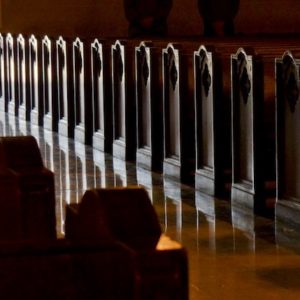Hafizah Geter: Why Writing Isn’t Solitary
In Conversation with Jordan Kisner on Thresholds
This is Thresholds, a series of conversations with writers about experiences that completely turned them upside down, disoriented them in their lives, changed them, and changed how and why they wanted to write. Hosted by Jordan Kisner, author of the essay collection Thin Places, and brought to you by Lit Hub Radio.
*
In this episode, Hafizah Augustus Geter (The Black Period) joins Jordan to discuss her family’s influence on her work, the power of memory, being in conversation with the writers you love, and how all of us live in a mix of genres.
Subscribe and download the episode, wherever you get your podcasts!
*
Mentioned:
Goya’s Black Paintings • “Fighting Erasure” by Parul Sehgal • Toni Morrison’s concept of rememory • Fela Kuti, Yussef Lateef, Otis Redding
*
From the conversation:
Hafizah Geter: For me, writing has always been the only door. It’s the only thing I’ve been good at and the only thing I’ve been inclined to always want to do. I think you do what you feel called to, and writing has always felt like my life’s purpose. And by having a father who’s an artist, I saw what it meant to live your life’s purpose, and that it wasn’t easy. It required courage. But you just had to do it. And whatever you’re doing had to be helping people. And so for me, there was never another path but this one, in writing.
In terms of how I came to that, it wasn’t until I was in it that I even recognized what I was doing. I think one of the best things we can do as writers is kind of lean on each other. There’s always that saying that writing is a solitary process, but it never really feels like that to me, because whether it’s in my mind or on the page, I’m in conversation with other writers I love.
One of the things that’s helped me get through this was I had a draft of the book done, but it was still not yet what it was going to be, and I could sense that. And I needed something to do. I needed a way through it. And so I intentionally was like, let me go find what other writers are doing.
And so I went in search of a question I could answer. And for me, that question became a question that I borrowed from a book critic, Parul Sehgal, where she asks, what would it look like to emerge from erasure? It’s a question that I loved because it wasn’t “what does it mean to emerge from erasure,” it was “what does it look like?” It literally demanded an action plan. And wasn’t this the question that I was asking throughout this? Like, how do I come back into a shape, into a form?
And so I thought, okay, what if, instead of navigating this question inside of myself, I do this on the page? And what if I actually try to answer it? And I think I come to that answer through another writer: Toni Morrison’s idea of re-memory, which is essentially taking your past and writing the narrative that you need that you can survive in. And that’s kind of what I do.
________________________________
For more Thresholds, visit us at thisisthresholds.com. Original music by Lora-Faye Åshuvud and art by Kirstin Huber.
Hafizah Augustus Geter is a Nigerian American writer, poet, and literary agent born in Zaria, Nigeria, and raised in Akron, Ohio, and Columbia, South Carolina. She is the author of the poetry collection Un-American, an NAACP Image Award and PEN Open Book Award finalist. Her writing has appeared in The New Yorker, Bomb, The Believer, The Paris Review, among many others. The poetry committee co-chair of the Brooklyn Literary Council, she is a Bread Loaf Katharine Bakeless nonfiction fellow, a Cave Canem poetry fellow, and a 92Y Women inPower Fellow and holds an MFA in nonfiction from New York University, where she was an Axinn Fellow. Hafizah lives in Brooklyn, New York.




















